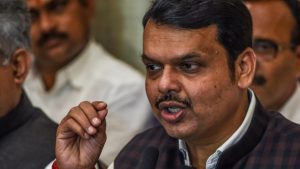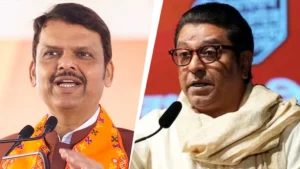Chief Minister Devendra Fadnavis has firmly addressed mounting criticism surrounding the Maharashtra Special Public Security Bill 2024, particularly responding to concerns raised by Maharashtra Navnirman Sena (MNS) chief Raj Thackeray. Fadnavis addresses urban Naxal claims by emphasising that the legislation specifically targets anti-national activities rather than legitimate political parties or peaceful protesters, as alleged by his critics.
The controversial bill has become a focal point of political discourse in Maharashtra, with opposition parties and civil rights organisations expressing serious concerns about its potential misuse. However, Fadnavis addresses urban Naxal claims with conviction, maintaining that the legislation is essential for combating the evolving threat of Left Wing Extremism in urban areas.

The Maharashtra Special Public Security Bill 2024 represents a comprehensive legislative framework designed to tackle what the state government identifies as the increasing menace of urban Naxalism. The bill seeks to prevent unlawful activities of Left Wing Extremist organisations with a focus on urban Naxalism and “passive militancy”, according to recent legislative developments.
Also Read: Fadnavis addresses urban Naxal claims – “Not about MNS, about the nation”
When Fadnavis addresses urban Naxal claims, he consistently emphasises that the menace of Naxalism is not limited to remote rural areas, but its presence is increasing in urban areas through Naxal frontal organisations. This evolution in security threats has necessitated specialised legislation to address contemporary challenges facing law enforcement agencies.
The bill grants significant powers to state authorities, including the ability to declare organisations as “unlawful” and implement stringent measures against suspected anti-national activities. These provisions have sparked intense debate about the balance between national security and civil liberties.
The political tension escalated when Raj Thackeray raised concerns about potential targeting of the MNS and legitimate protesters under the new legislation. In response, Fadnavis addresses urban Naxal claims by categorically rejecting such allegations and clarifying the bill’s actual objectives.
Separately, Fadnavis noted that the government is actively working to reinforce Maharashtra’s position as a leading growth hub.
The Chief Minister has been consistent in his messaging that the proposed law is not aimed at suppressing genuine dissenting voices, but to close down the dens of urban Naxals. This distinction forms the cornerstone of his defence against critics who fear the legislation could be misused to suppress political opposition.


Fadnavis addresses urban Naxal claims by drawing clear lines between legitimate political activity and anti-national elements that pose genuine security threats. His administration maintains that proper safeguards and judicial oversight will prevent any misuse of the legislation against legitimate political parties or civil society organisations.
Despite the Chief Minister’s assurances, significant opposition persists from various quarters. Civil rights organisations have expressed alarm about the bill’s broad definitions and potential for misuse. Critics argue that the Bill could turn Maharashtra into a police state and outlaw dissent as well as protestors as urban Naxals, representing serious concerns about democratic freedoms.
When Fadnavis addresses urban Naxal claims, he consistently counters these arguments by highlighting the specific nature of the threats being addressed. The administration argues that traditional security measures have proven inadequate in dealing with sophisticated urban networks that support extremist activities.
The opposition’s concerns centre on the subjective nature of determining what constitutes “anti-national” activity and whether adequate safeguards exist to prevent political persecution. These debates reflect broader national discussions about balancing security needs with constitutional rights.
The Maharashtra Special Public Security Bill 2024 introduces several key provisions that expand law enforcement capabilities. The state can declare an organisation as “unlawful” with an advisory board of three members providing oversight for such decisions.
Fadnavis addresses urban Naxal claims by emphasising that proper legal procedures and judicial review mechanisms are built into the legislation. The government maintains that these safeguards prevent arbitrary action while ensuring an effective response to genuine security threats.


The implementation framework includes provisions for appeal processes and regular review of decisions made under the act. These mechanisms are designed to address concerns about potential misuse while maintaining the legislation’s effectiveness against genuine threats.
The controversy surrounding the bill has significant implications for Maharashtra’s political landscape. Fadnavis addresses urban Naxal claims within a broader context of national security discourse and the evolving nature of extremist threats in India.
The Chief Minister’s firm stance reflects the BJP-led government’s commitment to robust security measures, even in the face of political opposition. Recent statements indicate that the government will continue pursuing arrests for ‘urban Naxal’ acts while maintaining that the bill doesn’t target dissenters.
Fadnavis addresses urban Naxal claims as part of a comprehensive strategy to modernise Maharashtra’s security apparatus. The government argues that traditional approaches have proven insufficient against contemporary threats that exploit urban environments and democratic freedoms.
As Fadnavis addresses urban Naxal claims, the debate continues to highlight fundamental questions about the balance between national security and democratic rights. The Chief Minister’s consistent message emphasises targeting genuine anti-national activities while protecting legitimate political expression and peaceful protest.
The implementation and impact of the Maharashtra Special Public Security Bill 2024 will likely serve as a critical test case for similar legislation across India. Fadnavis addresses urban Naxal claims with confidence in the bill’s necessity, but ongoing vigilance from civil society and opposition parties remains essential to ensure democratic safeguards are maintained.
The resolution of these concerns will ultimately depend on transparent implementation, robust judicial oversight, and the government’s commitment to distinguishing between legitimate dissent and genuine security threats. As the debate continues, Fadnavis addresses urban Naxal claims while navigating the complex intersection of security needs and democratic principles that define contemporary Indian governance.

